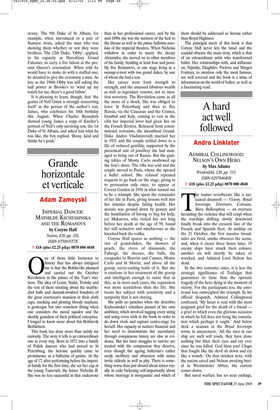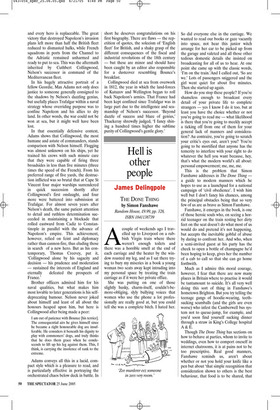A hard act well followed
Andro Linklater
ADMIRAL COLLINGWOOD: NELSON’S OWN HERO by Max Adams Weidenfeld, £20, pp. 333, ISBN 029784640X ✆ £18 (plus £2.25 p&p) 0870 800 4848 The names reverberate like a sustained drumroll — Victory, Royal Sovereign, Téméraire, Colossus, Mars, Bellerophon — an overture heralding the violence that will erupt when the warships drifting slowly downwind finally break into the crescent line of the French and Spanish fleet. At midday on the 21 October, the first massive broadsides are fired, smoke obscures the scene, and, when it clears three hours later, 19 enemy ships have struck their colours, another six will shortly be taken or wrecked, and Admiral Lord Nelson lies dead.
In the two centuries since, it is less the strategic significance of Trafalgar that guarantees its fame than the operatic tragedy of the hero dying in the moment of victory. For the participants too, the emotional loss outweighed the triumph. In his official despatch, Admiral Collingwood confessed, ‘My heart is rent with the most poignant grief for the death of a friend a grief to which even the glorious occasion in which he fell does not bring the consolation which perhaps it ought.’ And below deck a seaman in the Royal Sovereign wrote in amazement, ‘All the men in our ship are such soft toads, they have done nothing but blast their eyes and cry ever since he was killed. God bless you! Chaps that fought like the devil sit down and cry like a wench.’ On that stricken note, with the nation saved and Nelson awaiting burial in Westminster Abbey, the curtain comes down.
But naval warfare has no neat endings, and every hero is replaceable. The great victory that destroyed Napoleon’s invasion plans left more than half the British fleet reduced to dismasted hulks, while French squadrons in ports from the Channel to the Adriatic remained unharmed and ready to put to sea. This was the aftermath inherited by Cuthbert Collingwood, Nelson’s successor in command of the Mediterranean fleet.
In his hugely attractive portrait of a fellow Geordie, Max Adams not only does justice to someone generally consigned to the shadows by Nelson’s dazzling genius, but usefully places Trafalgar within a naval strategy whose overriding purpose was to confine Napoleon and his allies to dry land. In other words, the war could not be won at sea, but it might well have been lost.
In that essentially defensive context, Adams shows that Collingwood, the most humane and astute of commanders, stands comparison with Nelson himself. Flogging was almost unknown on his ships, yet he trained his crews with such minute care that they were capable of firing three broadsides in less than five minutes (three times the speed of the French). From his preferred range of five yards, the destruction inflicted was so brutal that at Cape St Vincent four major warships surrendered in quick succession shortly after Collingwood’s first onslaught, and four more were battered into submission at Trafalgar. For almost seven years after Nelson’s death, the same patient attention to detail and ruthless determination succeeded in maintaining a blockade that rolled eastward from Cadiz to Constantinople in parallel with the advance of Napoleon’s empire. This achievement, however, relied on feint and diplomacy rather than cannon-fire, thus eluding those in search of a new hero. But as his contemporary, Thomas Creevey, put it, ‘Collingwood alone by his sagacity and decision — his prudence and moderation — sustained the interests of England and eternally defeated the prospects of France.’ Brother officers admired him for his naval qualities, but what makes him most lovable to later generations is his selfdeprecating humour. Nelson never joked about himself and least of all about the honours heaped upon him, but here is Collingwood after being made a peer:
I am out of patience with Bounce [his terrier]. The consequential airs he gives himself since he became a right honourable dog are insufferable. He considers it beneath his dignity to play with commoners’ dogs, and truly thinks that he does them grace when he condescends to lift up his leg against them. This, I think, is carrying the insolence of rank to the extreme.
Adams conveys all this in a lucid, compact style which is a pleasure to read, and is particularly effective in portraying the orchestrated chaos below deck in battle. In short he deserves congratulations on his first biography. There are flaws — the repetition of quotes, the solecism of ‘English fleet’ for British, and a shaky grasp of the different consequences of the fiscal and industrial revolutions of the 18th century — but these are minor and should have been caught by an editor also responsible for a dustcover resembling Bounce’s breakfast.
Collingwood died at sea from overwork in 1812, the year in which the land-forces of Kutuzov and Wellington began to roll back Napoleon’s armies. That France had been kept confined since Trafalgar was in large part due to the intelligence and seamanship of Nelson’s successor. ‘Beyond dazzle of success and blaze of genius,’ Thackeray shrewdly judged, ‘I fancy shining a hundred times higher the sublime purity of Collingwood’s gentle glory.’



































































 Previous page
Previous page